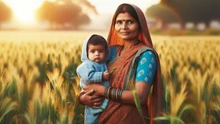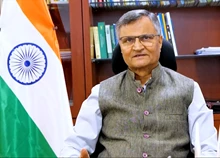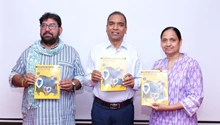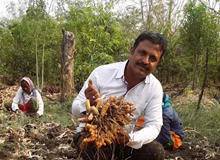
Narendra Singh Tomar, Union Agriculture Minister, today inaugurated the National Conference on Agriculture for Rabi Campaign 2022-23 at NASC, Pusa, New Delhi. In his address to the Conference, he stated that according to the 4th Advance Estimates (2021-22), the country's food grain production is estimated at 3157 lakh tonnes, which is 50 lakh tonnes more than the production of food grain in 2020-21. Total pulse and oilseed production is expected to reach a record 277 and 377 lakh tonnes in 2021-22, respectively.
Tomar stated that the Central and State Governments are working together to fulfill their agricultural responsibilities. A great deal of work has been done in the country in terms of production, resulting in an increase in the production of food grains, pulses, and oilseeds. Today, the priority is to address and resolve agricultural challenges.
In this regard, he mentioned the Pradhan Mantri Fasal Bima Yojana, under which farmers have received Rs 1.22 lakh crore in compensation for crop losses. According to Tomar, all farmers should be included in this scheme. This will especially reassure small farmers. He stated that the use of chemical fertilizers is reducing soil productivity, so organic and natural farming are being promoted. Prime Minister Modi's emphasis is also on natural farming. The agriculture sector is being advanced by the central government, which is led by the Prime Minister. Krishi Vigyan Kendras are also being established. State governments must also make greater efforts in this area.
The Minister expressed satisfaction with the Mustard Mission's success in the first two years of operation. In the last two years, mustard production has increased by 29%, from 91.24 to 117.46 lakh tonnes. Productivity increased by 10%, from 1331 to 1458 kg/ha. Rapeseed and mustard cultivation has increased by 17%, from 68.56 lakh ha in 2019-20 to 80.58 lakh ha in 2021-22. He praised the farming community and the state governments for their efforts. Increased mustard production will aid in filling the gap in palm and sunflower oil imports. On the model of the Mustard Mission, the government is now implementing Special Soybean and Sunflower Missions.
Tomar stated that the Central Government has begun work on Digital Agriculture to bridge the gap between farmers and the government so that farmers can benefit from government schemes in a transparent manner. Collaboration is also required on the digital agriculture mission. He also stated that, thanks to the Prime Minister's efforts, the year 2023 will be designated as the International Year of Millets. India will be the global leader in this programme. The government's effort is to increase millet production and exports, as well as farmers' income. He urged them to work together to promote nutritious cereals in their respective states. The Agriculture Minister released two books on this occasion.
The national target for total food grain production for 2022-23 has been set at 3280 lakh tonnes, with the rabi season contributing 1648 lakh tonnes. Intercropping, crop diversification, and productivity enhancement by introducing High Yield Varieties (HYVs), adoption of suitable agronomic practices in low-yielding regions, utilizing residual moisture, early sowing, and lifesaving irrigation for rabi crops would be the strategies.
The goal of this Conference is to review and assess crop performance during the previous crop seasons, set crop-specific targets for the rabi season in consultation with state governments, ensure the supply of critical inputs, and facilitate the adoption of innovative technologies in order to increase crop production and productivity. The government's top priority is agroecological crop planning to redirect land from surplus commodities like rice and wheat to deficit commodities like oilseeds and pulses, as well as high-value export crops. In consultation with states, the Prime Minister set the agenda for crop diversification and self-sufficiency in pulses and oilseeds at the 1st National Conference of Chief Secretaries in Dharamshala in June 2022.
In his address to the Conference, Kailash Chaudhary, Minister of State for Agriculture and Farmers Welfare, stated that the government has taken various initiatives to benefit farmers, including e-NAM, FPO, and digital agriculture. Krishi Vigyan Kendra (KVKs) and other Research & Development institutions will serve as knowledge centres to provide the technical know-how for the promotion of natural farming systems and the protection of farmers' interests in new farming systems.
Manoj Ahuja, Secretary, Department of Agriculture and Farmers Welfare, stated that the country's food grain production has been increasing since 2015-16. In the last seven years, total food grain production has increased by 25%, from 251.54 to 315.72 million tonnes. Oilseeds and pulses have followed a similar pattern.
Agriculture exports (including marine and plantation products) have surpassed USD 50 billion for the fiscal year 2021-22, the highest level ever achieved for agricultural exports.
Dr. Himanshu Pathak, Secretary (DARE) and DG of ICAR, emphasized the importance of adopting climate-resilient practices. He presented a global perspective on climate change and the adaptation strategies that are being implemented. Arti Ahuja, Secretary, Department of Fertilizers, emphasized the importance of timely fertilizer supply. She discussed the Department's efforts to ensure timely fertilizer supply.
According to Abhilaksh Lekhi, Additional Secretary, DAFW, there is a need to analyze digital agriculture strategies for the current rabi season. Chhavi Jha, JS (Drought Management), presented details of Drought Manual measures that states must implement in the event of a drought. States should step forward to assist distressed farmers and implement crop production contingency planning. Shubha Thakur, JS (Crops & Oilseeds), presented the five-year vision for making India self-sufficient in pulses and oilseed commodities. To meet the target of 325 lakh tonnes for pulses by 2025, it is proposed to increase area expansion by 14% and productivity enhancement by 23%.
Pramod Kumar Meherda, JS (Information Technology), presented a mission-mode project that will be implemented in collaboration with state governments to bring the benefits of digital technology and hi-tech solutions to all farming communities, particularly small and marginal farmers.











